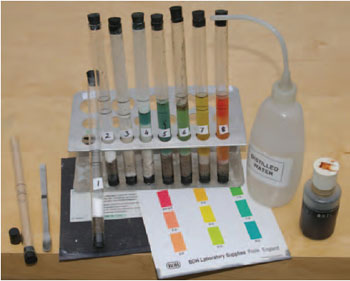Principles of Horticulture / Soil pH
Measuring pH
Content
pH can be measured using a pH meter or by the use of indicators;
both are used for testing soils. Soils sent to laboratories for analysis
would normally be tested with pH meters. Colour indicator methods are most commonly used by growers and gardeners who do their own
testing.
Colour indicator method
Required:
- Clean test-tubes; ideally ones that have stoppers that can be removed
top and bottom for easy cleaning;
- BDH soil pH indicator;
- BDH pH colour chart (kept in an envelope to prevent fading);
- Distilled water;
- Barium sulphate;
- Clean spatula or similar.
 |
Figure 20.3 Soil pH testing. Equipment required
includes
test tubes,
spatula, barium
sulphate,
pH indicator, colour chart. 1 Barium
sulphate added to
soil.
2 Distilled water
added. 3 Shake.
4 Add indicator
and leave to stand. 5,6,7,8
Check colour against
the
chart to find soil pH |
The soil to be tested should be a representative sample of the area
being analysed? Before the pH test is started, its texture
should be identified.
- The soil, preferably dried and sieved, is now added to the test-tube;
for ‘loams’ this should be to a depth of 2 cm (see below for heavier
and lighter soils).
- Add to this the same depth of barium sulphate (2 cm).
- Shake together.
- Half fill the test-tube with distilled water (some specially designed
tubes have a mark to fill to).
- Add soil pH indicator; for most soils only a few drops are required
(more can be added later).
- Place bung in top of tube and shake.
- Leave to stand.
- Find the soil pH by matching the
hue of the colour with one of the
colours on the chart. This should
be done by having the light coming
over the shoulder whilst holding the
tube against the white background
alongside the colour square on the
chart.
- If the colour is too concentrated
to see the hue add a little distilled
water; a few more drops of indicator
if too weak.
This procedure is suitable for most
soils, but it should be noted that the
barium sulphate is added to help clear
the water in order to see the colour
clearly (by flocculating the clay so that
it sinks more quickly to the bottom).
If the soil texture indicates a very light soil (low clay) or a very heavy one (high clay) then the proportions
should be altered as follows:
| |
Soil:Barium sulphate |
| ‘Loams’ |
2 cm:2 cm |
| Light soils |
3 cm:1 cm |
| Heavy soils |
1 cm:3 cm |
|
Support our developers






